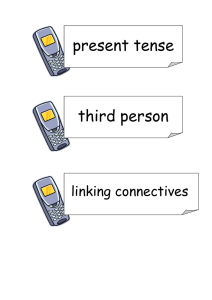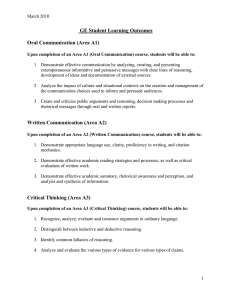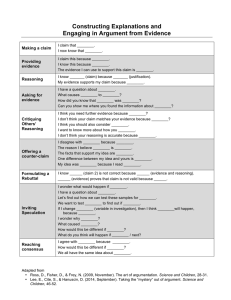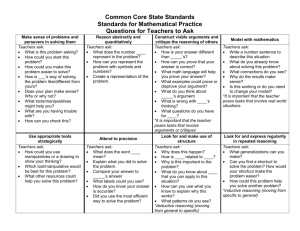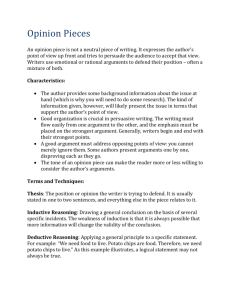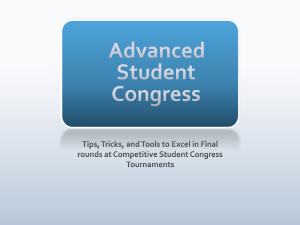phil-145-syllabus
advertisement
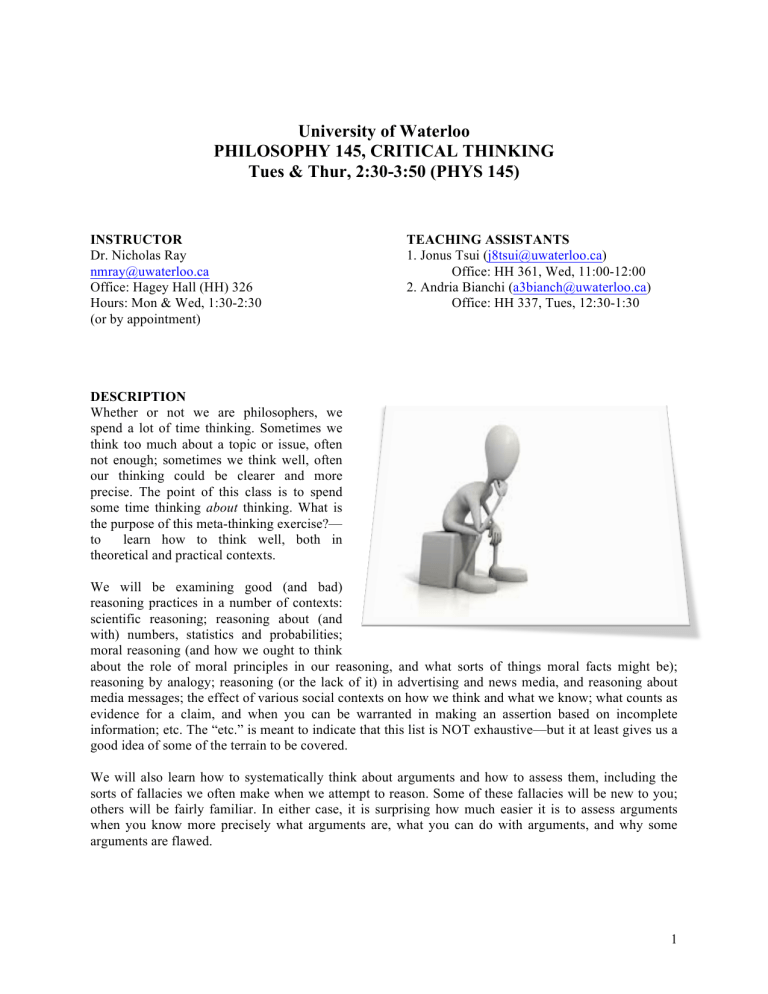
University of Waterloo PHILOSOPHY 145, CRITICAL THINKING Tues & Thur, 2:30-3:50 (PHYS 145) INSTRUCTOR Dr. Nicholas Ray nmray@uwaterloo.ca Office: Hagey Hall (HH) 326 Hours: Mon & Wed, 1:30-2:30 (or by appointment) TEACHING ASSISTANTS 1. Jonus Tsui (j8tsui@uwaterloo.ca) Office: HH 361, Wed, 11:00-12:00 2. Andria Bianchi (a3bianch@uwaterloo.ca) Office: HH 337, Tues, 12:30-1:30 DESCRIPTION Whether or not we are philosophers, we spend a lot of time thinking. Sometimes we think too much about a topic or issue, often not enough; sometimes we think well, often our thinking could be clearer and more precise. The point of this class is to spend some time thinking about thinking. What is the purpose of this meta-thinking exercise?— to learn how to think well, both in theoretical and practical contexts. We will be examining good (and bad) reasoning practices in a number of contexts: scientific reasoning; reasoning about (and with) numbers, statistics and probabilities; moral reasoning (and how we ought to think about the role of moral principles in our reasoning, and what sorts of things moral facts might be); reasoning by analogy; reasoning (or the lack of it) in advertising and news media, and reasoning about media messages; the effect of various social contexts on how we think and what we know; what counts as evidence for a claim, and when you can be warranted in making an assertion based on incomplete information; etc. The “etc.” is meant to indicate that this list is NOT exhaustive—but it at least gives us a good idea of some of the terrain to be covered. We will also learn how to systematically think about arguments and how to assess them, including the sorts of fallacies we often make when we attempt to reason. Some of these fallacies will be new to you; others will be fairly familiar. In either case, it is surprising how much easier it is to assess arguments when you know more precisely what arguments are, what you can do with arguments, and why some arguments are flawed. 1 INTENDED LEARNING OUTCOMES Philosophy majors and non-majors will populate this course. The overarching goals are that everyone learns some specifics about critical thinking and argument theory, but also that students take away lasting skills that are very useful (whether or not you are a philosopher). These skills include (amongst others) good reading and writing skills, good critical reflection skills, the ability to assess and construct arguments, and an understanding of the way we form beliefs, and how to avoid forming bad ones. By the end of this course, you should be able to: 1. Define and describe key reasoning and argumentation concepts, and analyze arguments well. 2. Understand how biases affect our reasoning, how to properly categorize different biases, and utilize techniques for overcoming the deleterious effects of biases in your own thinking. 3. Critically analyze (a) course material, (b) the arguments of your peers, and (c) your own work. 4. Utilize critical comments on your work to make that work better. 5. Recognize and explicate the difference between inductive and deductive arguments, as well as the difference between arguments directed at truth and those designed merely to persuade. 6. Learn how to think more clearly about tough subjects key to a philosophical education and a reflective life, including the sciences, numbers, ethics, the media, etc. ACHIEVING THE LEARNING OUTCOMES How can you best ensure that these learning outcomes are likely to be achieved? Here is a good list to follow: a) Come to class prepared to engage in discussion, having done at least a good chuck of the reading for the week. b) Get an early start on assignments, and actually think about them. Study for the test and the exam strategically, and work with others whenever possible. Thinking is often regarded as a supremely individual enterprise. This isn’t always, or even normally, the case. Thinking is often better done within a community, as we shall see later in the term. c) Follow guidelines: all of the assignments, tests, and the exam have very precise guidelines. It is best not to lose grades for small errors, e.g. not properly formatting your work. d) Don’t be a lone wolf: always remember that you have a community of peers, the professor, and your TAs to help you through the material. (This is related to point b above.) e) Speak your mind: asking questions is always a good thing. If you are curious or confused, lots of other people are curious or confused. There is no shame in admitting that. It shows that you are thinking! It also shows that you are willing to have others help you in your thinking, and ready to help others think clearly too. f) Make this YOUR course: make sure you are doing something you find interesting. No assignment is set in stone, and there are always ways of changing assignments (with the guidance of the prof and TAs). Students should even think of the exams as fairly flexible. If you don’t like how the professor is designing your course, say something!!! COURSE TEXTS* Tim Kenyon, Clear Thinking in a Blurry World. First Edition. Nelson Education Canada. (Available in the Bookstore, or through most online retailers.) * Other optional readings are available as links on the Schedule below and/or on LEARN. 2 COURSE ASSESSMENTS & DUE DATES Length Argument Analysis 1* 2 pages Peer Critique Project approx. 1 page In Class Test N.A. Argument Analysis 2* 3-4 pages After-Lecture Questions 1-3 sentences Final Exam N.A. Date Oct. 9 Oct. 9 Oct. 30 Nov. 20 End of each lecture Set by Registrar** Value 15% 10% 15% 20% 20% 20% * The Argument Analyses will be deducted 10% per day for lateness, including weekends. **Students are expected to keep the exam period free in their schedules. Only documented illness, conflict with other exams, or serious life events are grounds for getting a make-up exam. OVERVIEW OF ASSESSMENTS (Specific Guidelines and Instructions to Follow) Argument Analyses For the first Argument Analysis you will be provided with an argument. (There may be some choice.) You will reconstruct the argument, showing how premises are connected to each other and to subconclusions and overall conclusions. You will then assess the argument, indicating what kind of argument it is meant to be, and how effective it is as an argument. This will be your first chance to reconstruct and assess an argument by applying key course concepts. Argument Analysis 2 is very similar, though slightly more involved on your part. The first difference is that YOU will be going and finding the argument you are going to analyze, and YOU will be responsible for motivating your choice of argument, and telling your reader why it is interesting and significant. The second difference is that it comes much later in the term. You will have more conceptual tools with which to offer a more nuanced and sophisticated analysis, so more will be expected of you. Peer Critique You will bring a paper copy of Argument Analysis 1 to class on Oct. 9 and have a peer read over it and then offer you constructive criticism. When your peer is done, you will then reflect on his or her critique, and give a brief account of how you would take this information to heart if you were to revise your Analysis. If you fail to come with an Analysis in hand, then you lose these grades. Test This test will help us assess your specific conceptual knowledge using multiple-choice, true/false, and other such assessment tools. This is the only assessment that will be machine-graded. Final A standard, mixed-methods final exam that covers material from the whole term. We will go over the Final near the end of term, but no part of this exam will be machine-graded. After-Lecture Questions Students will be required to submit 10 questions throughout the term regarding something they found interesting or confusing in that week’s readings/lecture. Students will write these on a small piece of paper, and submit them at the end of lecture. These questions will often structure following lectures for us, focusing our attention on the most important issues. Students will also find class discussion easier as a result. No questions can be submitted on the first day of class, the last day of class, on the day of the test, or the day of the Peer Critique. This leaves 20 opportunities to submit 10 questions, and you have to be at the lecture to submit them. (You can only submit one question per class.) 3 TENTATIVE SCHEDULE This is our “plan of attack” for the term, but things might change. It is your job to come to lecture and make regular use of LAERN so you know what material we are actually talking about at any given point. Sept. 9 and 11: What is Critical Thinking? Kenyon, “Preface” and “Introduction” (If you can get ahead and start reading Chapter 1, that’s great. We will be covering some Chapter 1 material this week, but the bulk will be left for discussion next week.) Sept. 16 and 18: Deductive Arguments, Validity, and Truth Kenyon, “Chapter 1, The Parts of Public Thinking: Deductive Argument” Plato, Gorgias (OPTIONAL) (In the Gorgias, Plato, through Socrates, discerns the difference between “rhetoric”, which aims at changing beliefs of those in courts of law and other assemblies (i.e. public persuasion) with “dialectic”, which uses the tools of logic and argumentation to arrive at truth. We will discuss the difference, but having done the reading is not necessary.) Sept. 23 and 25: Evidence and Ampliative Reasoning Kenyon, “Chapter 2, Evidence Adds Up” Hume, An Enquiry Concerning Human Understanding, Section IV, Part II (OPTIONAL) (Here Hume outlines what we now call “the problem of induction”, though he doesn’t use the word “induction” in his work. The question is this: we think we know that the future will be like the past, or that observation yet to come will be like ones that have already passed. On what grounds can we justify such claims?) Sept. 30 and Oct. 2: Beyond what is Said: Performativity, Implicature, and Rhetorical Effects Kenyon, “Chapter 3, Language, Non-Language, and Argument” Oct 7 and 9*: Identifying Fallacies Kenyon, “Chapter 4, Fallacies: When Arguments Turn Bad” *Peer Review will take up most of lecture on Thursday Oct. 14* and 16: Thinking About Numbers and Fallacies of Numerical Reasoning Kenyon, “Chapter 5, Critical Thinking About Numbers” *Because of the Peer Review the previous week, we will likely still be talking about fallacies at the beginning of Tuesday’s class. Oct. 21 and 23: Statistical and Probabilistic Reasoning Kenyon, “Chapter 6, Probability and Statistics: Reasoning from Incomplete Information” Oct. 28 and 30*: Biases Kenyon, “Chapter 7, Biases Within Reason” *In-class Test will take up most of the day on Thursday Nov. 4 and 6: Biases Continued Finish reading Kenyon Chapter 7, if you haven’t yet. Nov. 11 and 13: Reasoning in Social Contexts Kenyon, “Chapter 8, The More We Get Together: Social Cognition and the Flow of Information” McIntosh, “White Privilege: Unpacking the Invisible Knapsack” (OPTIONAL) 4 Nov. 18 and 20: Science Kenyon, “Chapter 9, Critical Reasoning About Science: Cases and Lessons” Nov. 25 and 27*: The News Kenyon, “Chapter 10, The Mainstream Media as a Source of Information” * A significant part of our final meeting will be used to go over the Final Exam, for which you will be provided sample questions. If the Final is scheduled particularly early in the exam period, we might do this on Tuesday Nov. 25 instead. ACADEMIC INTEGRITY In order to maintain a culture of academic integrity, members of the University of Waterloo are expected to promote honesty, trust, fairness, respect and responsibility. Discipline: A student is expected to know what constitutes academic integrity, to avoid committing academic offences, and to take responsibility for his/her actions. A student who is unsure whether an action constitutes an offence, or who needs help in learning how to avoid offences (e.g., plagiarism, cheating) or about “rules” for group work/collaboration should seek guidance from the course professor, academic advisor, or the Undergraduate Associate Dean. When misconduct has been found to have occurred, disciplinary penalties will be imposed under Policy 71 – Student Discipline. For information on categories of offenses and types of penalties, students should refer to Policy 71 - Student Discipline. Grievance: A student who believes that a decision affecting some aspect of his/her university life has been unfair or unreasonable may have grounds for initiating a grievance. Read Policy 70 - Student Petitions and Grievances, Section 4. Appeals: A student may appeal the finding and/or penalty in a decision made under Policy 70 - Student Petitions and Grievances (other than regarding a petition) or Policy 71 - Student Discipline if a ground for an appeal can be established. Read Policy 72 - Student Appeals. OTHER SOURCES OF INFORMATION FOR STUDENTS Academic integrity (Arts) Academic Integrity Office (uWaterloo) ACCOMODATION FOR STUDENTS WITH DISABILITIES Note for students with disabilities: The AccessAbility Services office, located in Needles Hall Room 1132, collaborates with all academic departments to arrange appropriate accommodations for students with disabilities without compromising the academic integrity of the curriculum. If you require academic accommodations to lessen the impact of your disability, please register with the AS office at the beginning of each academic term. 5

